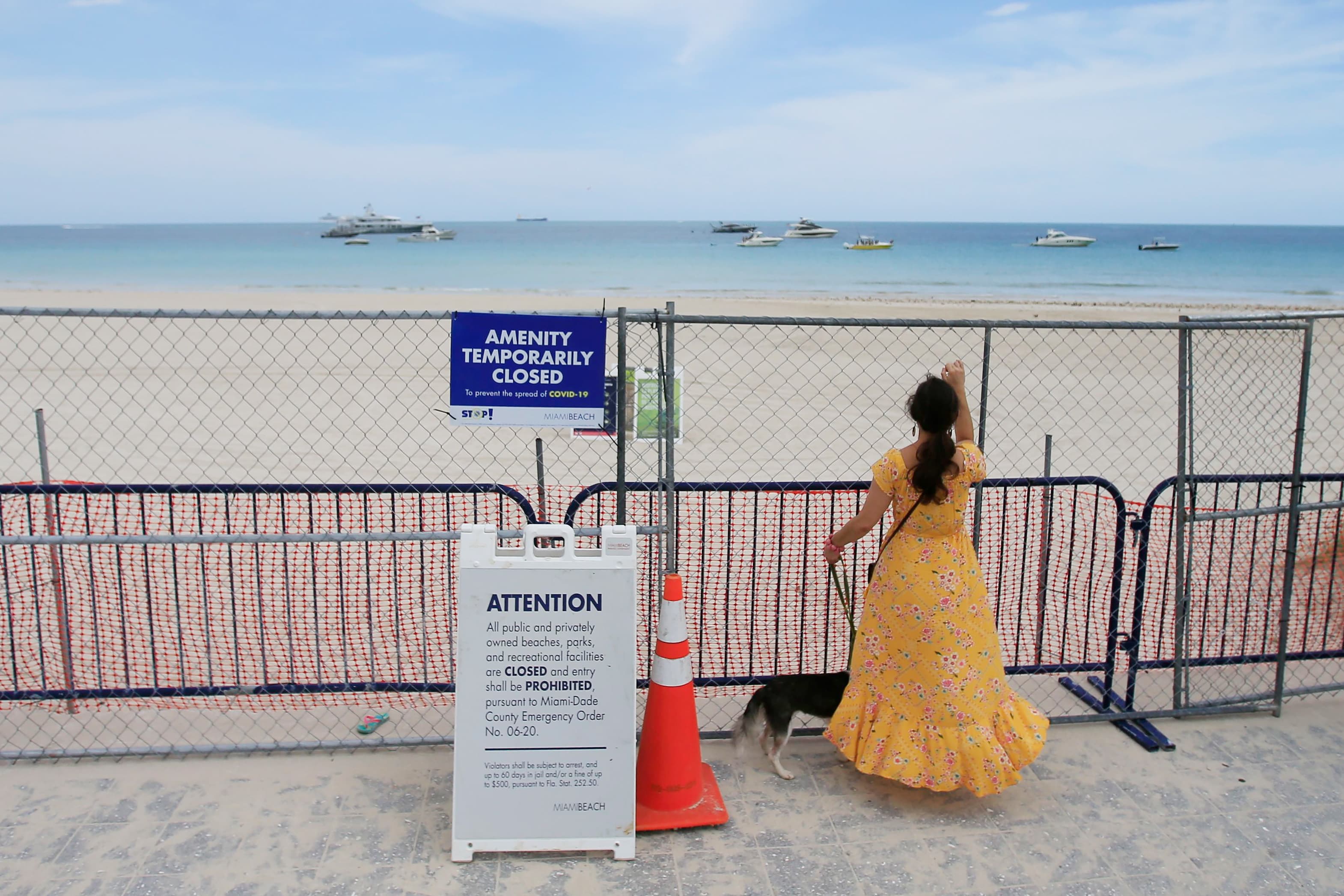
Florida and Texas hit a record number of daily coronavirus cases on Saturday, respectively reporting 11,445 and 8,258 new cases in the last 24 hours, according to figures released by the states’ health departments.
The virus has infected more than 190,000 people in Florida and at least 3,700 people have died, and new cases in the state have increased by 67% based on a seven-day average.
The number of infections in Texas has now reached nearly 192,000 as hospitalizations there surge. Hospitals in at least two Texas counties, Starr and Hidalgo, are at full capacity and local officials are urging residents there to shelter-in-place and avoid gatherings.
Florida reported Saturday that 14.1% of those tested for the virus were positive while Texas reported a positive rate of 13.1%, both well above the 5% threshold that the World Health Organization advises as a safe level for governments to reopen business. Those testing positive in Florida tend to be younger, with a median age of 35 as of Saturday. In Texas, available data shows a large portion of those testing positive are between 20 and 39 years old.
Though deaths from the virus in Florida have remained on a downward trajectory, Surgeon General Dr. Jerome Adams has warned that fatalities lag new cases and a clearer picture might not emerge for two weeks or more.
Even as Florida reports record case numbers, Gov. Ron DeSantis has said he won’t close businesses again and has repeatedly refused to order a statewide mask mandate to curb the spread of the virus, though the governor has indicated that Florida won’t move forward with its reopening plan for now.
Florida comprises roughly 20% of new cases in the U.S, which are spiking across the American South and West. The nation has reported more than 52,000 new cases as of Friday, the third day in a row the number has exceeded 50,000. White House health advisor Dr. Anthony Fauci warned this week that new cases could top more than 100,000 a day.
Local governments in Florida are taking more aggressive measures. Miami-Dade and Broward Counties announced they were closing beaches for the July 4th holiday weekend. Miami-Dade, Florida’s most populous county, has also imposed an overnight curfew from 10 p.m. until 6 a.m. until further notice and will close some businesses that reopened in June.
“This curfew is meant to stop people from venturing out and hanging out with friends in groups, which has shown to be spreading the virus rapidly,” Miami-Dade Mayor Carlos Gimenez said in a statement.
Miami-Dade and Broward have also have announced orders requiring people to wear face masks in public.
In Texas, Gov. Greg Abbott issued an executive order on Thursday requiring people to wear face coverings in public in counties with 20 or more coronavirus cases.
Abbott also ordered Texas bars to close and restaurants to reduce seating capacity at the end of June amid a new surge in cases. Texas was one of the first states to lift lockdown restrictions during the pandemic, and many businesses were granted permissions to reopen in May.
Vice President Mike Pence, who visited Tampa on Thursday, praised Florida’s governor for his “innovative” response to the pandemic and said that Florida is in a “much better place” to fight the current outbreak. Pence postponed campaign events in Florida due to the increase in positive cases there. The Trump administration has dismissed calls for the federal government to mandate the wearing of masks nationwide.
The Republican National Convention is still scheduled in Jacksonville, Florida at the end of August, though Jacksonville fundraisers have found that donor money is on hold due to worries about the surge in coronavirus cases.
Infectious disease specialist Aileen Marty warned Friday that Florida was “heading a million miles an hour in the wrong direction” in dealing with the pandemic and said residents are not following public health guidelines to slow the spread.
“It’s absolutely the saddest thing, the most unnecessary situation that we’re finding ourselves in,” Marty said in an interview with “CBS This Morning.” “And it’s behaviorally driven.”
The U.S. has reported more than 2.7 million infections since the pandemic hit the nation and at least 129,509 deaths, according to data from Johns Hopkins University.



